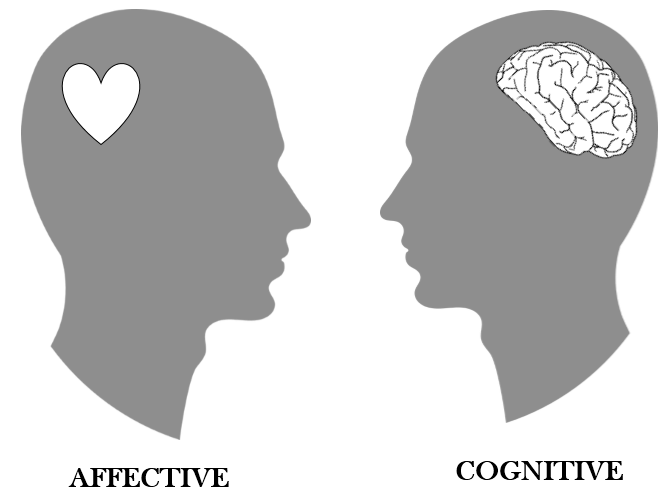Key Difference – Affective vs Cognitive
Affective and cognitive are two adjectives that are used in various fields and have different meanings. In this context, we will discuss their usage in relation to empathy, attitudes, and learning. Affective generally refers to emotions, moods, and feelings, whereas cognitive is related to the process of cognition. This is the key difference between affective and cognitive.
What Does Affective Mean?
The term affective is commonly used to discuss the domain of learning, attitudes, or types of empathy.
What is Affective Empathy?
Affective empathy, also known as emotional empathy or primitive empathy, is the ability to respond with an appropriate emotion to another’s mental state. In other words, this describes the feelings and sensations we get in response to someone else’s emotions. Mirroring what that person is feeling or feeling stressed when we notice someone’s fear or anxiety is included in affective empathy.
What is Affective Attitude?
Affective attitude refers to the emotional reaction one has to something. Here, our feelings or emotions are brought to the surface about something, such as fear or hate. For example, someone might have the attitude they hate spiders because they are repulsive or scary.
What is Affective Domain of Learning?
Affective domain is one of the three main domains of learning, with other two being cognitive and psychomotor. Affective domain includes feelings, emotions, attitudes, motivations, appreciation, etc.
What Does Cognitive Mean?
The term cognitive is commonly used to discuss the domain of learning, attitudes, or types of empathy.
What is Cognitive Empathy?
Cognitive empathy is the ability to identify and understand another’s mental state or perspective.
What is Cognitive Attitude?
Cognitive attitude involves a person’s beliefs, ideas, or knowledge about something. Generalities or stereotypes may help in the formation of this type of attitudes. For example, someone may believe that spiders are poisonous and dangerous.
What is Cognitive Domain of Learning?
Cognitive domain involves knowledge and the development of mental or intellectual skills. There are six major categories of cognitive processes: knowledge, comprehension, application, analysis, synthesis, and evaluation.
What is the difference between Affective and Cognitive?
Domain:
Affective domain includes feelings, emotions, attitudes, motivations, appreciation, etc.
Cognitive domain includes knowledge and the development of mental or intellectual skills.
Attitude:
Affective attitude refers to the emotional reaction to something.
Cognitive attitude involves a person’s beliefs, ideas, or knowledge about something.
Empathy:
Affective empathy refers to the feelings and sensations we get in response to someone else’s emotions.
Cognitive empathy is the ability to identify and understand another’s mental state or perspective.
Key Takeaways
- Affective refers to emotions, moods, and feelings, while cognitive is related to the process of cognition.
- Affective domain includes feelings, emotions, attitudes, motivations, appreciation, etc., while cognitive domain includes knowledge and the development of mental or intellectual skills.
- Affective attitude refers to the emotional reaction to something, while cognitive attitude involves a person’s beliefs, ideas, or knowledge about something.
